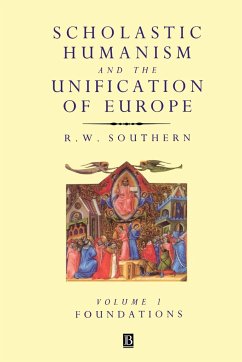'This is the most important book in recent decades on the twelfth-century renaissance and its significance.' --Norman F. Cantor, New York Univeristy 'The book is a model of how to combine forceful argument with elegant presentation, and is going to be an important vehicle for conveying an understanding of medieval thought and the Christian enterprise.' --Theology 'Because it is so clear and accessible, it is just what teachers of medieval culture (whether in Europe or America) have been looking for. But Richard Southern is intending much more here than a superb student text. [This] is a book for everyone interested in the origins of modern western culture and the history of knowledge.' --Michael Clanchy, University College, London At the beginning of the twelfth century a group of scholars began an enterprise of unprecedented scope. Their intention was to produce a definitive body of knowledge that would be as perfect as humanity's fallen state permits, and which would provide a view of God, nature, and human conduct, promoting order in this world and blessedness in the next. Scholastic Humanism and the Unification of Europe reconsiders this enterprise, and its long-term effects on European History. The whole work will be in three volumes. This first is concerned with the beginnings, in the years between 1060 and 1160, when the main lines of scholastic thought were laid down and its agenda established. The book explores the social, intellectual, and political conditions behind the establishment of the new system in the great schools of learning in France and Italy, and the rewards that attracted experts who could both administer the system and make it known and acceptable to the generality of people whose lives were affected by it. Scholastic Humanism and the Unification of Europe will be a work of seminal importance for the understanding of the civilization of the Middle Ages, and of the evolution of modern European societies.
"Here the 'practical, intellectual and spiritual aspects' oftwelfth-century history are discussed by a historian whoseknowledge of the period and mastery of the art of writing arealmost without equal." History Today
"The combination of synthesis with fresh and vivid work ondetail is one of Southern's particular gifts ...The proportions ofthe book will fit harmoniously into the overarching structureoutlined at the start of the book, but this volume can also standjust as well on its own - already a classic." Reviews inHistory
"The recovery of scholasticism therefore calls for twoqualities: technical expertise, and lucidity of thought andexpression. No historian combines these qualities moreconspicuously than R.W. Southern." Times LiterarySupplement
"This book is more than a synthesis of a life's work ontwelfth-century Western culture by Britain's greatest medievalist -it is the most important book in recent decades on thetwelfth-century renaissance and its significance. This is a book tobe treasured and reflected upon for years to come." Norman F.Cantor, New York University
"That such a sweeping vision is expressed so lucidly, whilesimultaneously conveying the human details and experience of theperiod with a combination of sensitivity and scholarly rigour,justifies the description by its first reviewers: 'masterpiece.'"Journal of Ecclesiastical History
"The combination of synthesis with fresh and vivid work ondetail is one of Southern's particular gifts ...The proportions ofthe book will fit harmoniously into the overarching structureoutlined at the start of the book, but this volume can also standjust as well on its own - already a classic." Reviews inHistory
"The recovery of scholasticism therefore calls for twoqualities: technical expertise, and lucidity of thought andexpression. No historian combines these qualities moreconspicuously than R.W. Southern." Times LiterarySupplement
"This book is more than a synthesis of a life's work ontwelfth-century Western culture by Britain's greatest medievalist -it is the most important book in recent decades on thetwelfth-century renaissance and its significance. This is a book tobe treasured and reflected upon for years to come." Norman F.Cantor, New York University
"That such a sweeping vision is expressed so lucidly, whilesimultaneously conveying the human details and experience of theperiod with a combination of sensitivity and scholarly rigour,justifies the description by its first reviewers: 'masterpiece.'"Journal of Ecclesiastical History

